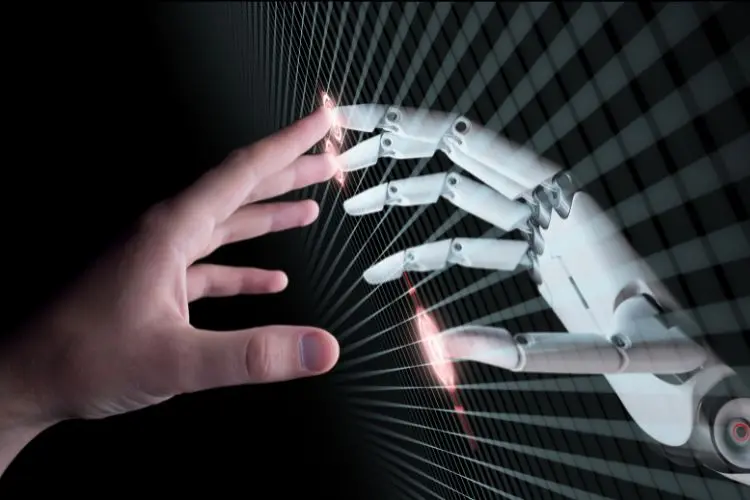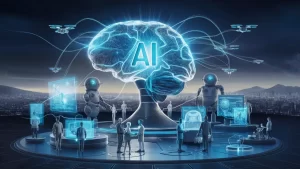Artificial Intelligence (AI) has transcended into the realm of sci-fi stories and has become an integral element of our lives. It’s not obvious it but AI is a part of our communication and work, travel, and also entertain ourselves. While it is not only confined to labs and technology businesses, AI is shaping and improving the quality of experiences across all sectors and making our lives more convenient flexible, efficient, and personal. This article explores the various ways AI is woven into daily life, and provides real-world examples that will help you get a better understanding of its impact.
AI in Smartphones
The smartphone that you are holding is among the closest encounters that you will are able to have with AI everyday. From unlocking your smartphone with facial recognition to the voice assistant that you use to request weather updates, AI makes sure that your smartphone is more than a device for communicating. Features such as predictive text and auto-correction can help simplify messaging, while apps such as Siri, Google Assistant, and Alexa respond to your requests and set alarms, or respond to questions. AI will also tailor your experience, either by offering app recommendations based on the way you behave or optimizing the use of your battery.
AI in Transportation
If you commute via train, car or use a rideshare app, AI likely plays an active part. Autopilot, a self-driving system developed by Tesla Autopilot is pave the way to a future in which autonomous vehicles rule the roads. Today, even apps such as Google Maps and Waze employ AI to assess the traffic conditions in real-time providing the most efficient and speediest routes. Ride-hailing services like Uber and Lyft make use of AI to pair riders to drivers, calculate pricing and estimate time of arrival. AI can also help airlines improve flights and schedules and ensures smoother travel.
AI in Home Automation
AI transforms our homes to smart houses. devices such as Nest thermostats as well as Amazon Echo speakers utilize AI to analyze your preferences and habits. For example the smart thermostat analyzes your cooling and heating habits and adjusts temperatures to conserve energy, while also keeping you comfortably. In addition, voice-controlled assistants are able to play music and answer questions, keep track of the shopping list, or even manage other devices connected to your home. Security systems that are powered by AI such as Ring Doorbell Cameras come with options like motion detection as well as facial recognition, which makes your home more secure and intelligent.
AI in Entertainment
AI has changed the way people consume their entertainment resulting in entertainment more personal and enjoyable. streaming services such as Netflix along with Spotify depend heavily upon AI algorithms to suggest films, TV shows and songs that match with your preferences. Browse through YouTube’s homepage and you’ll find AI curating content that is that are based on what you normally listen to. Gaming is also heavily influenced by AI, which helps enhance virtual environments and provides game-playing opponents that adapt to your style of play to provide an engaging experience. Even social media platforms employ AI to recommend posts to follow, or show information that keeps you entertained.
AI in Healthcare
AI is changing healthcare in ways that directly impact both patients and healthcare professionals. Wearable technology, like Fitbit as well as Apple Watch, uses AI to track your heart rate as well as sleep patterns and even your activity levels. Wearable devices can alert users or medical professionals of potential health concerns. In terms of clinical applications, AI diagnostics have become essential, with systems such as IBM Watson helping doctors analyze medical records of patients and provide treatments. AI-powered chatbots in medical apps can identify symptoms and direct users to the appropriate action, saving time and money in healthcare.
AI in Finance
In the area of managing your money, AI has made personalization and security the top priority. Applications like Mint or You Need a Budget use AI to study how you spend money, and recommend ways to save. The fraud detection systems used in banking make use of AI to detect unusual transactions and safeguard your accounts. Algorithmic trading utilizes AI to make instant decision-making, allowing banks to make the most of their profits. Customer support chats within banking apps utilize AI to answer basic questions and provide 24/7 support.
AI in Retail
Shopping has evolved into a personalized and efficient because of AI. Online retailers like Amazon employ predictive analytics to recommend items in response to your browsing habits and purchasing past purchases. This personalization feature makes shopping easier for shoppers and also profitable for merchants. AI aids retailers in optimizing supply chains and inventory by ensuring that the most popular items are always available. Some retailers are even testing with cash-less shopping, in which AI-enabled systems can track your purchases and bill you instantly, and eliminate the need for cash registers.
AI in Education
AI opens the door to personal learning in education. Tools such as Duolingo or Khan Academy adapt to your learning progress, providing lessons that are suited to your learning style and level. Certain schools are now using AI tools to evaluate assignments, and even teach students about certain subject areas. AI-powered tools aid teachers in developing flexible and interactive lesson plans. Chatbots manage administrative tasks, such as answering questions from students about homework deadlines or assignments. These advances make learning easier and more accessible to educators as well as students.
Why AI Matters in Your Daily Routine
AI has become more than just a technological concept that was once thought to be a futuristic one. It is a part of the majority of aspects of modern living, improving efficiency and convenience as well as opening up new possibilities. If you’re keeping track of your health planning a trip or unwinding with a tv show, artificial intelligence is working in the background. While we usually ignore these technologies but understanding their significance will help us utilize them better and appreciate the innovations that are creating our world.
FAQs
1. What exactly is AI simply put?
AI or Artificial Intelligence, refers to machines and systems that are that are programmed to emulate human intelligence. They are able to learn, change to tasks, and even perform solving problems, recognizing patterns or taking decisions.
2. Does AI appropriate for use in everyday day
It is true that AI that is integrated into everyday activities, such as smartphones and smart home appliances is generally safe. But it is important to take note of privacy issues, especially when sharing personal information.
3. Do you think AI be able to take over the jobs?
AI can be expected to automatize certain tasks, thereby changing needs of the market for jobs. But, it could also provide new opportunities in areas like AI development as well as support and ethics surveillance.
4. What can I do to profit of AI in my the comfort of my home?
AI-powered home automation systems such as thermostats, smart speakers and security devices help you manage your household easier secure, efficient, and energy-efficient.




